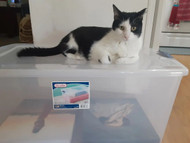When Feline Friends Claim Possession: Tales of a Cat and Personal Belongings
Posted by Jess Perna on Jul 16th 2022
My brother's cat Maggie has decided she wants my paintings and will not give them back. She landed on the crate they were in and refused to return them. What's a guy to do? She is so cute! Maybe she will open an art gallery for me!

Cats are known for their independent and sometimes quirky behavior. They can be incredibly endearing and entertaining, but they can also leave us scratching our heads in disbelief. One such behavior that cat owners often encounter is when their beloved feline friends decide to claim possession of their stuff. In this blog post, we'll explore why cats do this, what items they're most likely to "take over," and how you can peacefully coexist with your purring roommate.
1. Why Do Cats Claim Possession?
Cats are territorial animals, and they often mark their territory with scent markings. When a cat takes possession of your belongings, it could be related to their natural instinct to mark and claim an area as their own. Here are some common reasons why cats do this:
Comfort and Security: Cats often feel safe and secure in areas that smell like them. By mingling their scent with your belongings, they create a comforting environment.
Attention-Seeking: Some cats may "borrow" your things to get your attention. If they notice that you react when they interact with your belongings, they might do it more frequently.
Curiosity: Cats are naturally curious creatures. They may explore and interact with your stuff simply because they find it intriguing.
2. What Belongings Are Often Targeted?
While cats can potentially take possession of anything within their reach, some items seem to be more appealing to them. Here are a few examples of belongings that cats frequently lay claim to:
Clothing and Fabric Items: Cats are drawn to soft, comfortable materials like clothing, blankets, and towels. These items can be particularly attractive for kneading, nesting, or simply lounging.
Electronics and Cords: The movement of cords and cables can trigger a cat's hunting instincts. Many cat owners have discovered their chargers and cables mysteriously chewed upon.
Paper and Documents: The rustling sound of paper and the opportunity to bat at moving objects can make your paperwork a tempting target.
3. How to Coexist Peacefully with Your Possessive Cat
Living harmoniously with a cat who enjoys claiming your possessions requires understanding and patience. Here are some tips to help you maintain a balanced relationship:
Provide Adequate Entertainment: Keep your cat mentally and physically stimulated with toys, scratching posts, and interactive play. A well-entertained cat is less likely to seek entertainment in your belongings.
Designate Cat-Friendly Areas: Set up designated areas where your cat can relax and play, complete with comfy bedding and toys. This can help redirect their attention away from your things.
Use Deterrents: If certain items need to be protected, consider using cat deterrents like double-sided tape, aluminum foil, or pet-safe sprays to make them less appealing to your cat.
Positive Reinforcement: Reward your cat with praise and treats when they choose to interact with their designated toys and areas instead of your belongings.
Conclusion:
Cats claiming possession of your stuff is a common behavior that, while sometimes perplexing, can be managed with understanding and a few practical strategies. Remember that your cat's actions are often driven by instincts and a desire for comfort and security. By providing appropriate outlets for their needs and patiently redirecting their attention, you can coexist harmoniously with your furry friend and your cherished belongings.

